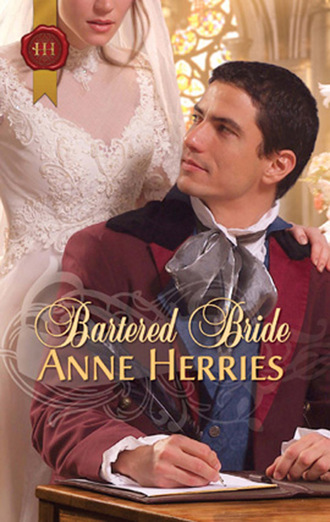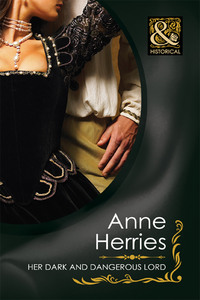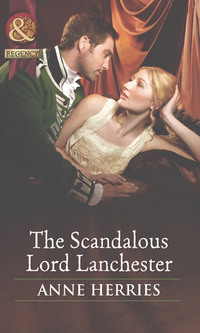
Полная версия
Bartered Bride

“Release me from the contract and I will make certain Papa pays you every penny from the estate.”
“No. Jilt me and you will be ruined, your father and sister with you.”
“But why?” Lottie was puzzled.
“Because I need an heir. One woman is as good as another in the dark. Your father owes me and you chose to deceive me. You will keep your part of the bargain whether you wish it or not.”
Tears were stinging behind her eyes, but Lottie refused to let them fall.
“Have it your own way, sir. You hold all the cards it seems but you may come to regret this…” She walked past him and this time he let her go.
Bartered Bride
Harlequin® Historical #303—March 2011
ANNE HERRIES
Award-winning author Anne Herries lives in Cambridgeshire, England. She is fond of watching wildlife, and spoils the birds and squirrels that are frequent visitors to her garden. Anne loves to write about the beauty of nature, and sometimes puts a little into her books—although they are mostly about love and romance. She writes for her own enjoyment, and to give pleasure to her readers. She invites readers to contact her on her website: www.lindasole.co.uk.
Bartered Bride
Anne Herries

MILLS & BOON
Before you start reading, why not sign up?
Thank you for downloading this Mills & Boon book. If you want to hear about exclusive discounts, special offers and competitions, sign up to our email newsletter today!
SIGN ME UP!
Or simply visit
signup.millsandboon.co.uk
Mills & Boon emails are completely free to receive and you can unsubscribe at any time via the link in any email we send you.
Available from Harlequin® Historical and ANNE HERRIES
*A Knight of Honor #184
*Her Knight Protector #188
**Lady in Waiting #202
**The Adventurer’s Wife #208
††Forbidden Lady #209
†An Improper Companion #227
††The Lord’s Forced Bride #231
†A Wealthy Widow #235
†A Worthy Gentleman #243
††Her Dark and Dangerous Lord #249
‡Marianne and the Marquis #258
‡Married by Christmas #261
‡Marrying Captain Jack #265
The Unknown Heir #269
Ransom Bride #276
††Fugitive Countess #279
Bought for the Harem #285
The Homeless Heiress #292
Secret Heiress #297
Bartered Bride #303
Did you know some of these titles are also available as ebooks? Visit www.eHarlequin.com
A Season in Town
a new miniseries from Anne Herries
Look for
A Country Miss in Hanover Square An Innocent Debutante in Hanover Square The Mistress of Hanover Square
Coming soon
Praise for Anne Herries
“In An Innocent Debutante in Hanover Square, Anne Herries shows us how life was not always easy for the less fortunate in Regency England… These and other social issues combine with danger…making it a great read from beginning to end.”
—Cataromance
Contents
Prologue
Chapter One
Chapter Two
Chapter Three
Chapter Four
Chapter Five
Chapter Six
Chapter Seven
Chapter Eight
Chapter Nine
Chapter Ten
Chapter Eleven
Chapter Twelve
Chapter Thirteen
Chapter Fourteen
Chapter Fifteen
Prologue
Nicolas, Marquis of Rothsay, nine and twenty, tall, strong, handsome, and known to most of society as a cold heartless rake, looked helplessly at the diminutive lady before him. Henrietta, Countess Selby, might reach no higher than his shoulder in her heels but she was the only person he would heed, the only person he truly cared for in the world—and, he sometimes thought, the only person who cared two hoots for him.
‘Marry to get an heir, dearest Henri?’ he murmured, looking at his godmother with a sceptical expression. ‘Who do you suppose would have me? The matchmaking mamas take one look and stay well clear of me for fear I may corrupt their little darlings.’
‘More fool them,’ Henrietta replied, a sparkle in her eye. ‘Besides, it is no such thing. You know very well that there are many young ladies who would be happy to become your wife.’
‘Why, for the sake of my fortune?’
His dark eyes smouldered, a mutinous, brooding expression on lips that could at certain moments be sensual and passionate, but were, these days, more often set in lines of disdain or disappointment. His memory strayed to a woman he had known some years previously, when he was first a green youth on the town.
‘The lady will give you an heir—or more than one to be safe. In return, you will keep her in comfort for the rest of her life. Surely an heir is worth a little effort? You owe it to the family, Nicolas. Also, you should remember your father’s last request. He did not exactly make it a condition of his will, but it was his dying wish that you should provide the estate with an heir. You are in your thirtieth year, dearest, and while I would not suggest you are past your prime, I should hate you to leave things too late.’
‘Should you, dearest Henri?’ Only his beloved godmother would dare to say such a thing to him, and only she could make him smile at the idea that he might soon be past his prime. ‘I suppose Cousin Raymond might be called my heir?’
‘That nincompoop? He has no more brain than a pea-goose and thinks only of his appearance and what is the latest scandalous tale upon the town.’ Henrietta fixed him with a compelling stare. ‘If you will not do it for yourself, then do it for me. Had I to refer to Raymond as the head of the family, I should soon find myself in my grave.’
‘Poor Henri.’ Nicolas smiled affectionately, becoming in that moment a very different man than was known in the clubs and certain drawing rooms in London. ‘Has my cousin been lecturing you on my morals again? He tried to remind me of my duty to the family name recently. I fear I sent him about his business with his tail between his legs.’
‘Perfectly understandable. I should have done the same in your place. He has no right to tell you how to behave, Rothsay. Yet, do you not see, that makes it all the more important for you to set up your nursery? If Raymond begins to imagine himself your rightful heir, it will make him more conceited than ever—and perhaps resentful if at the last minute you produce an heir. Besides, the children of old men are often weaklings.’
‘Henrietta, I adore you.’ Nicolas swept his godmother from her feet, planting a kiss on her cheek. She gave him a mocking wrathful look and he set her down carefully. ‘Forgive me, but you tempt me so.’
‘Remember I am more than twice your age and to be treated with respect,’ Henrietta said, but there was a smile in her eyes. ‘Will you at least consider marriage, Nicolas?’
Nicolas caught the hint of tears in her eyes and realised that the matter of his heir was important to her. She had no children of her own and, although not precisely lonely, for she had many friends, she must wish for a child to dote on. He suspected that his godmother had not been truly well for a while now. She might be thinking of making her own will, and, while he knew himself her favourite, he believed she would leave her fortune to his son if he had one. She was forever telling him he had more money than was good for him.
In his heart Nicolas knew that her pleas made perfect sense. It was time he produced an heir for the family. His father had begged him to do so on his death bed and Nicolas had pushed the memory to the back of his mind, a little resentful that his father should make such a demand after the neglect of years.
The trouble was that he had become used to his life as it was and had no wish for a change. Love caused more trouble than it was worth and he would avoid it at all cost—but perhaps a marriage of convenience might suit him? It was, as Henrietta said, his duty. He was not yet in his dotage, but if his lack of a wife was causing his godmother distress, he must certainly give it some consideration.
‘For your sake I shall give the matter of an heir some thought—when I return from Paris.’
‘You intend to visit Paris?’
‘Yes, for a few weeks. The company grows stale in London. I need a change of air.’
‘What you need is a passionate adventure,’ Henrietta replied. ‘I do not mean your opera dancers and actresses, who oblige you for the sake of the money you lavish on them. No, Nicolas, you need to fall desperately in love and to be brought back to life. I fear you have no real interest in anything.’
‘Love is a myth,’ he replied, withdrawing from her, a look of disdain upon his mouth. ‘If I marry, it will be to a woman who understands that I must be free to live my own way. As you said, there need be no more than a token marriage on either side. She will give me an heir. I shall give her a home and jewels and there it ends—if I find anyone foolish enough to take me, that is.’
Even for Henri’s sake, he had no intention of surrendering his heart and soul to love. He had witnessed the way love destroyed a man, making him a shadow of his former self, and causing him to withdraw into a lonely place inside his head. Nicolas’s father had worshipped his mother; when she died, he had shut himself off from everyone, including his only child—leaving Nicolas to cope with the loss of both parents alone.
As a young man he had briefly believed himself in love but learned a sharp lesson when the young lady laughed at his offer of devotion. After Elizabeth, he had decided that he would never let another woman under his skin.
‘Believe me, I can do without a romantic attachment, Henri. Love is for fools.’
‘Well, I have said my piece. You must go your own way, Nicolas—and now I shall bid you good morning.’
‘Leaving already?’ The smile had come back to his dark eyes. ‘Stay and have nuncheon with me? It is rare enough that you honour me with a visit, Henri.’
‘If you visited Rothsay Manor occasionally, I dare say I should see more of you. London is too much of a racket for me these days.’
‘You are not truly unwell?’ For a moment real anxiety flashed into his eyes.
Henrietta smiled. The boy she had loved was still there beneath the cold aloof manner he had assumed these past years.
‘No, dearest, I am not unwell—and, yes, I shall stay and eat with you since you ask…’
Chapter One
‘What have you there?’ Lady Hoskins asked as Charlotte Stanton entered the parlour carrying a letter. ‘Is it from your father?’
‘From Clarice,’ Lottie answered with a smile. ‘She apologises for not having written before, but they have been too busy.’
‘Too busy!’ Aunt Beth gave a snort as she looked at her favourite niece. ‘Too busy to write to her own twin? Well, is that not typical of them both? They leave you here and go gallivanting off to Paris while you have the bother of an invalid.’
‘I did not wish to go to Paris with them,’ Lottie replied a little untruthfully. She might have wished to go had her aunt been in better health, or if Clarice had agreed to remain at home with her this time. ‘Besides, you were quite unwell, dearest Beth. I could not have been happy knowing you were here alone.’
‘Nonsense, I have Muffet and the maids,’ Lady Hoskins replied, but the tone of her voice told Beth that she would not have wished to be left alone to cope.
‘I would much rather be here in the country with you than racketing around all those hotels and gaming halls with Papa. Besides, someone had to give an eye to the estate, though Mr Jackson is a very good agent and does his best for us.’
‘Well, I certainly hope that your sister is not racketing around gambling clubs,’ her aunt said looking alarmed. ‘It would be quite improper for a young woman of her age. Your father is a confirmed gambler and will never change. It was the death of my poor sister, never knowing where the next penny would come from. That, my dearest Lottie, is what you get for marrying a rake and a gambler.’
‘Papa did break Mama’s heart,’ Lottie admitted, sadness in her eyes. ‘She had to follow him all over Europe, never knowing whether they would have enough money to pay for a roof over their heads or the next meal. It was fortunate that Papa was left this house. At least Mama was able to rest here in peace for a few years, though Papa did not stay long with her. He does have a small mortgage on the house, of course, but the bank will not lend him any more. That is just as well, otherwise, I fear we should not have a roof over our heads.’
Lottie looked round the charming room. Although the soft furnishings and curtains were faded and showing signs of wear, it was a comfortable place to sit in the afternoons. At this precise moment the sun was pouring in through the French windows, which they had opened to allow for some air. The furniture was for the most part old, some of it belonging to an age long gone, heavy carved Jacobean pieces that gave Lottie a feeling of permanence, of belonging. However, the previous owner had been an admirer of Mr Chippendale and there was a very handsome bookcase in the best parlour, as well as a set of good chairs in the dining room. Aunt Beth sat in a comfortable wing chair, her sewing table to hand and a book of poetry on the wine table at her side. Lottie, too, had been reading earlier, and her book lay on the small elegant sofa.
‘What else does your sister say?’ Aunt Beth enquired as Lottie sat down to read her letter.
‘She says that Papa lost a large sum of money to an English marquis playing piquet…’ Lottie turned the page, scanning some lines of rather indignant writing from her twin. ‘Oh dear…that is too bad of Papa. No, no, he really has gone too far this time. No wonder Clarice is angry.’
‘Why? Do not keep me in suspense a moment longer!’
Lottie handed the letter to her aunt, who frowned over it for some minutes before returning it to her.
‘That is both ridiculous and disgusting,’ Aunt Beth said. ‘How dare he?’
‘What, you mean how dare Papa accept—or how dare the marquis make such an outrageous request?’
‘Both,’ Aunt Beth said, looking affronted. ‘I have never heard of such a thing—to suggest that your father should give him Clarice in payment for a gambling debt—it is the outside of enough!’
‘The marquis has said he will marry her,’ Lottie said thoughtfully. ‘I suppose in a way it might be a good thing for Clarice. Besides, it could be worse—he might have demanded she become his mistress…’
‘How can you think so?’ Aunt Beth shook her head. ‘The marquis must be a rake. He is probably old enough to be her father—a lecherous old devil who will lead Clarice a hell of a life.’
‘If he is, she must not marry him.’ Lottie got to her feet. ‘We shall know soon enough—they are coming home in a few days. Clarice said the marquis provided the money for their return. Otherwise they might have been stuck in France until we could send more money.’
‘And where would we get that, pray? I have nothing left but my pearls—which are for you, Lottie, when you marry—and fifty pounds a year. Clarice had the garnets when she was engaged, and she did not return them when she broke off her engagement. What little I have is for you, my dear.’
‘Do not speak of such things,’ Lottie begged her. ‘I pray you will live for many years yet. Besides, I am not sure I shall marry.’
‘Why ever not? You are the equal of your sister in looks, and your character is superior. She has had chances enough—why should you not?’
Lottie sighed. ‘I should wish to marry for love, but then poor dear Mama married the man of her dreams—and they very soon turned to ashes.’
‘My sister was a silly little thing, though I loved her dearly,’ Aunt Beth said. ‘However, I married a man who had both background and money—and look where that got me.’
Lottie nodded. Her uncle had not gambled away his money at the tables, but on a series of bad investments—including being caught in a scandal that had been almost as calamitous as the South Seas Bubble, which had ruined so many people in 1720—and had left his widow with very little fortune. Aunt Beth had been forced to sell her home and come to live with her sister and nieces after her husband died in a riding accident. Then Aunt Beth had taken care of her and Clarice after their mother died, and Lottie at least had become very fond of her.
‘I suppose if one of us were to marry a rich man we might all be comfortable.’ Lottie frowned. ‘But Clarice sounds very angry. I do not think she will agree and if she does not…’
‘Do you think we might lose the house?’ A look of anxiety crossed Aunt Beth’s face. ‘Where should we go then, Lottie?’
Lottie had no idea. She had lain awake more than one night recently, worrying about what would happen if her father lost what little money he had at the tables. She had begged him not to go on this latest visit to Paris, but he could never rest in the country for more than a few weeks at a time, and Clarice had demanded to go with him. Now her father owed more than he could pay and both he and Clarice were on their way home.
Nicolas threw his gloves and hat on to the sideboard in the spacious hall of his London house. His boots clattered on the marble floor, the resulting sound echoing to the high ceilings. He was not in the best of tempers and it showed in the set of his mouth and the brooding expression in his eyes.
‘Did you have a good journey, my lord?’ his butler dared to ask.
‘No, damn it, I did not,’ Nicolas snapped. ‘Have Harris lay up some things for me. I shall be going into the country for a few days.’
‘Yes, my lord—certainly. Is there anything more, sir?’
‘No… Yes, you can wish me happy, Barret. I am to be married, and quite soon I think.’
‘My lord…’
Nicholas left his butler in shock as he took the stairs two at a time. He smiled grimly. The one consolation in the whole sorry business was that it would set the cat amongst the pigeons once the story got out. A reluctant smile touched his lips. At least he could still laugh at society and himself—but why the hell had he done it?
It was true that he had promised Henrietta he would consider the idea of marriage, but to ask for the hand of a woman—he would not call her a lady, for she was an adventuress—he had only just met was ridiculous.
Nicolas had at first refused when Sir Charles Stanton had offered him his daughter as payment for the gambling debt. However, after a night of reflection, he had decided that one woman was as good as another. His memory of being ridiculed by Elizabeth when he declared his love had made him determined never to offer his heart again. Therefore Sir Charles’s offer was a convenient way of solving his problem. Clarice had been brought up as a lady, of that he had no doubt—but he had not known when he’d agreed to the deal that her morals were those of an alley cat.
It was on the night after he had signed the contract Sir Charles had hastily had drawn up with their joint lawyers that Nicolas discovered his mistake. One of Nicolas’s friends had been visiting Paris and they had gone out to a gaming club together, both of them drinking more than usual. Ralph Thurlstone had been three sheets to the wind and Nicolas rather more drunk than was sensible when he discovered his friend in a back room of the club. Ralph was lying senseless on the bed while a very pretty young woman with long spun-gold curls emptied his pockets of what money he had left. From the look of her hair and crumpled gown, he suspected that she had been on the bed with Ralph prior to robbing him.
‘What the hell do you imagine you are doing?’ Nicolas enquired dangerously.
‘Taking what belongs to me,’ the woman replied, her green eyes flashing with temper. ‘He owes me and this is scarcely recompense for what he took.’
‘Are you telling me you were a virgin before this evening?’
‘Would you believe me?’
‘No.’
‘Then I shall tell you nothing,’ the woman said and passed him, going out of the room.
Nicolas had let her go. In truth, he was still stunned by what he had seen. Returning to the main rooms a little later, he discovered Sir Charles at the tables, and standing at his back was the young woman he had seen going through Ralph’s pockets moments earlier. Nicolas had thought he must have been mistaken, but there was no mistake. Clarice Stanton, his bartered bride-to-be, had robbed his friend while he lay in a drunken stupor.
‘Ah, Rothsay,’ Sir Charles said, looking up. ‘Sit down and join us, won’t you? Clarice is bringing me luck tonight. I was down to my last guinea but she brought me ten more and I have won the pot of two hundred.’
Which he would no doubt lose before he rose from the tables, Nicolas thought.
Nicolas looked the young woman in the eyes and saw her flush. Until this evening, he had not met Stanton’s daughter, not bothering to propose to her but leaving it to the father to tell her of their arrangement. He supposed that he had intended to speak to her in his own good time. When he recklessly signed the marriage contract, he had been acting on impulse. He had heard on the rumour mill that Stanton’s daughter was pretty, but as he was engaged to her already, sight unseen, her looks were not his primary concern. He had thought only that she was available and would give him the heir everyone said he needed.
To his horror, he had contracted himself to marry a thief and a wanton. What a damned fool he had been!
Henrietta had begged him to marry for the sake of the family. He hardly dared to contemplate what she would say if she knew the truth.
He must find a way to withdraw—but how could it be done? Anger smouldered inside him as he saw the young woman continue to encourage her profligate father at the tables. When Stanton rose a winner of some two thousand pounds or more, she flashed him a look of triumph, as if daring him to expose her to the world.
Needless to say, Nicolas had kept his mouth closed. It would have exposed him to ridicule, as well as Ralph, whom he knew to be newly engaged to a respectable English girl. His friend had been feeling a little hedge-bound, because his mother-in-law to be was demanding he dance attention on her daughter the whole time. Ralph had escaped to Paris for a last fling, and would never know that he had not spent all his guineas at the tables. The loss was one he could afford, but Nicolas was affronted by the idea that he had agreed to marry a woman of such low morals.
Nicolas had left Paris the next day, sending his would-be father-in-law a sharp note dictating that he take his daughter back to England to await his further instructions.
As soon as he had set foot in town, Nicolas visited his family lawyer to discover if the contract was watertight, and apparently it was. Nicolas could of course withdraw and compensate the girl for breach of promise. He would no doubt have to pay through the nose to be free of her. His mouth drew into a thin line as he contemplated the scandal.
No, better that he find a way of forcing the woman to withdraw. He would be ridiculed in the clubs whichever way it went, but if Miss Stanton withdrew it could all be settled by a payment for her bruised pride—if she had any—and there would be less scandal.
It was his own fault for giving in to a wild impulse. He could not blame Henrietta, who would certainly not have advised such a reckless affair. Nicolas smiled wryly. The irony of it was that such a marriage would have suited him had the woman not been a thief and a cheat. She was certainly pretty enough, and, if compliant, might have had her own house and done much as she pleased once she had given him a couple of heirs.











